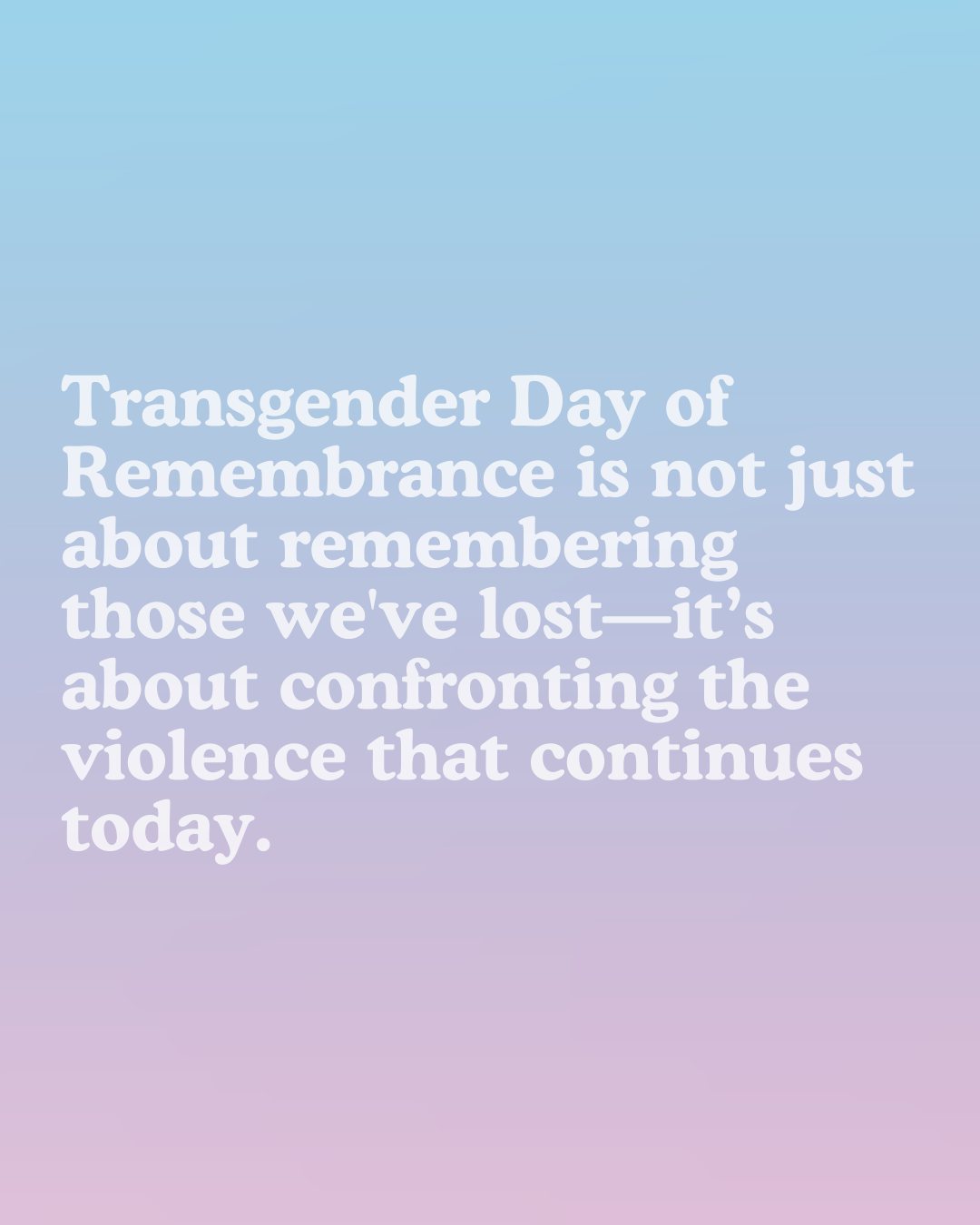CMHA Algoma honours Transgender Day of Remembrance
At CMHA [branch], we recognize that the violence faced by 2 Spirit, trans, and non-binary individuals is not a thing of the past—it is an urgent and ongoing crisis. On Transgender Day of Remembrance (TDOR), we mourn those whose lives were lost to anti-trans violence while acknowledging the persistent systemic barriers and discrimination these communities endure today.
The Reality of Anti-Trans Violence
The statistics are staggering. According to the 2SLGBTQI+ Action Plan Survey, 39% of 2SLGBTQI+ Canadians have experienced violence due to discrimination in the past five years. Alarmingly, this includes:
- 63% of Two-Spirit individuals and 54% of trans women reporting experiences of physical and sexual violence.
- 67% of trans women and 55% of trans men considering personal safety risks when deciding how to present in public.
- 91% of victims do not report incidents to the police due to mistrust and fear of inaction.
In Ontario, 40% of 2SLGBTQI+ individuals report experiencing violence or discrimination related to their identities.
Mental Health Impacts
Two-spirit, trans, and gender-diverse individuals face higher rates of mental health challenges, with 30% reporting fair or poor mental health, compared to fewer than 10% of non-2SLGBTQI+ individuals. Unfortunately, only 17% of 2SLGBTQI+ Ontarians have access to specialized mental health services.
Barriers like discrimination in healthcare settings, a lack of culturally safe and affirming spaces, and social stigma exacerbate these challenges. For example, 21% of trans individuals in Ontario avoid emergency care during crises due to fear of mistreatment.
A Community of Resilience
Despite these barriers, the 2 Spirit, trans, and non-binary communities continue to demonstrate resilience, advocacy, and strength. TDOR is not only a day of mourning but also a call to action for allies to stand in solidarity and push for systemic change.
How You Can Support
- Educate Yourself and Others: Learn about the unique challenges faced by gender-diverse individuals and share this knowledge.
- Advocate for Inclusive Policies: Push for affirming and culturally safe mental health services.
- Amplify Voices: Support organizations and initiatives led by 2SLGBTQI+ communities.
Resources for Support
- LGBT Youthline: Peer-led support for 2SLGBTQI+ youth across Ontario.
- The Trevor Project: Crisis support for 2SLGBTQI+ youth.
- Rainbow Health Ontario: Training and resources for affirming healthcare.
- Trans Wellness Ontario: Mental wellness support for 2SLGBTQI+ individuals.
Terminology Matters
Using affirming names and pronouns is a simple but powerful way to show respect and support. It’s about acknowledging identity and challenging harmful norms.
Honouring Lives, Building Futures
This TDOR, let’s commit to creating a safer, more inclusive world for 2 Spirit, trans, and gender-diverse individuals. Together, we can confront transphobia, amplify marginalized voices, and ensure everyone can live free from fear and violence.
References:
Federal 2SLGBTQI+ Secretariat. (2021). 2SLGBTQI+ Action Plan Survey Findings. Government of Canada: https://www.canada.ca/en/women-gender-equality/free-to-be-me/federal-2slgbtqi-plus-action-plan/survey-findings/quick-stats.html
Platt, L. F., Wolf, J. K., & Scheitle, C. P. (2018). Patterns of mental health care utilization among
sexual orientation minority groups. Journal of Homosexuality, 65(2), 135-153. https://doi.
Org/10.1080/00918369.2017.1311552
Steele, L. S., Daley, A., Curling, D., Gibson, M. F., Green, D. C., Williams, C. C., & Ross, L. E.
(2017). LGBT identity, untreated depression, and unmet need for mental health services
by sexual minority women and trans-identified people. Journal of Women’s Health,
26(2), 116-127. https://doi.org/10.1089/jwh.2015.5677
Bettergarcia, J., Matsuno, E., & Conover, K. J. (2021). Training mental health providers in queer affirming
Diversity, 8(3), 365–377. https://doi.org/10.1037/sgd0000514
Sherman, A. D., Clark, K. D., Robinson, K., Noorani, T., & Poteat, T. (2020). Trans* community connection, health, and well-being: A systematic review. LGBT Health, 7(1), 1-14. https://
doi.org/10.1089/lgbt.2019.0014
Curlew, A. (2019, August 20). Transgender hate crimes are on the rise even in Canada. The Conversation. https://theconversation.com/transgender-hate-crimes-are-on-therise-
even-in-canada-121541
https://egale.ca/awareness/qmh/?utm_source=homeslider&utm_medium=homeslider
Bauer, G. R., Scheim, A. I., Pyne, J., Travers, R., & Hammond, R. (2015). Intervenable factors
associated with suicide risk in transgender persons: A respondent driven sampling
study in Ontario, Canada. BMC Public Health, 15(1), 525. https://doi.org/10.1186/s12889-
015-1867-2
Salway, T., Ross, L. E., Fehr, C. P., Burley, J., Asadi, S., Hawkins, B., & Tarasoff, L. A. (2019). A
Systematic Review and Meta-Analysis of Disparities in the Prevalence of Suicide
Ideation and Attempt Among Bisexual Populations. Archives of Sexual Behavior, 48(1),
Giblon, R., Bauer, G. R. (2017). Health care availability, quality, and unmet need: a comparison of transgender and
cisgender residents of Ontario, Canada. BMC health services research, 17(1), 283. BioMed Central Open. https://doi.
org/10.1186/s12913-017-2226-z
GLAAD. Transgender Day of Remembrance: https://glaad.org/tdor/#:~:text=Transgender%20Day%20of%20Remembrance%20(TDOR,acts%20of%20anti%2Dtransgender%20violence.
Ontario Human Rights Commission. Questions about gender identity and pronouns: https://www.ohrc.on.ca/en/questions-and-answers-about-gender-identity-and-pronouns
Ontario Human Rights Commission. Questions about gender identity and pronouns: https://www.ohrc.on.ca/en/questions-and-answers-about-gender-identity-and-pronouns
Human Rights Campaign Foundation. Transgender and Non-Binary People FAQ: https://www.hrc.org/resources/transgender-and-non-binary-faq#:~:text=Non%2Dbinary%20is%20an%20identity,all%20non%2Dbinary%20people%20do.
Re:Searching for 2SLGBTQA+ Health. Two-Sprit Community: https://www.lgbtqhealth.ca/two-spirit-community

